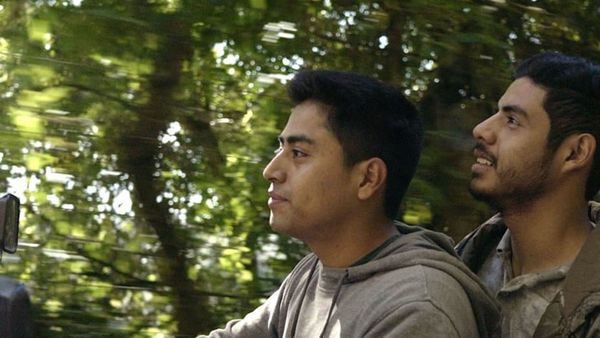Eye For Film >> Movies >> José (2018) Film Review
José
Reviewed by: Amber Wilkinson

This low key drama by Chinese director Li Cheng is a measured character study that considers what it is like to be young, gay and living on the breadline in Guatemala. The script, co-written with George F Roberson, draws on hundreds of interviews undertaken by the filmmakers and their fastidiousness shows through in the neo-realism of the end result. The use of non-professional actors is also, by and large, a positive, as it allows for a sincerity of performance even if the delivery is occasionally a little on the flat side.
José (Enrique Salanic) lives with his single mum in cramped quarters, getting up early and heading out on the bus early with her as she heads to sell sandwiches and he goes to his job that involves flagging down cars before serving them food at the drive-by diner where he works. The one bright spot in his life is the face of his mobile phone - it literally lights up his evenings and helps him to find men to hook up with in pay-by-the-hour hotels. That is, until construction worker Luis (Manolo Herrera) enters his life and a much more emotional connection begins to form.

Cheng shows how just keeping your head above water is a constant battle in José's world, immersing us in the daily grind, while showing how society is largely held together by family and religion. He doesn't need to rub our faces in the restrictions this imposes on José and Luis, with reference to a homophobic attack by members of Luis' own family, coupled with the pair's guarded body language in the street enough to tell us all we need to know.
The story is slight, but Cheng treats the subject matter with care, allowing a slow but certain heat to build between José and Luis, capturing the way that straightforward sex becomes increasingly supplemented by gestures of fondness as their relationship grows, with innocuous things like a motorbike ride becoming an exercise in closeness and foreplay.
Although the director makes sure we're aware of the expectations of wider Guatemalan society, he keeps the emotional focus tight on José as he grapples with the choice between 'potential' futures that are suddenly presented to him. Although the emotionally saturated music cues do the film no favours and it meanders a little towards the end, this is nevertheless a worthwhile look at a part of Guatemalan society infrequently captured on film.
Reviewed on: 06 Sep 2018














